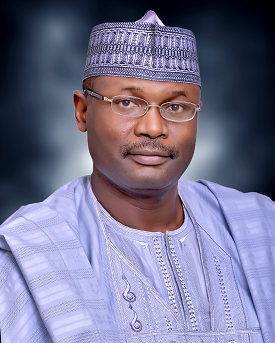In a striking statement, Nigeria’s INEC Chairman, Prof Mahmood Yakubu, praised Ghana for its smooth 2024 presidential election, highlighting that the country had drawn significant lessons from Nigeria’s own electoral process.
Yakubu’s comments came amid growing concerns and criticisms about Nigeria’s controversial 2019 and 2023 general elections, where accusations of irregularities and voter disenfranchisement clouded the integrity of the process.
Speaking in a video seen by SaharaReporters, Yakubu praised Ghana’s political stability and innovative electoral practices. He noted that the country had specifically learned from Nigeria on how to manage constituency election results more effectively.
“The lesson Ghana learned from Nigeria is in managing constituency election results,” Yakubu stated. “Until the last election in Ghana, all results came to the Electoral Commission’s headquarters in Accra. But now, they have adopted Nigeria’s system of returning officers announcing results in constituencies across the country, which has made the process much faster and more efficient.”
Yakubu’s reference to Ghana’s electoral process follows a successful presidential election held on December 7, 2024, where former President John Mahama of the National Democratic Congress (NDC) emerged victorious.
In a gracious show of sportsmanship, Mahama’s main opponent, Vice President Mahamudu Bawumia, conceded defeat. Bawumia confirmed he had personally called Mahama to congratulate him, acknowledging the will of the people. “The people of Ghana have spoken and they have voted for change at this time. We respect this with all humility,” Bawumia said in a statement.
The fast-moving process of announcing results stood in stark contrast to past Ghanaian elections, where delays were common as all results were first sent to the central Electoral Commission office in Accra before being declared.
“The declaration of the presidential election result was a lot faster than it used to be in the past,” Yakubu said, explaining that Ghana’s adoption of Nigeria’s electoral system played a crucial role in streamlining the process.
Despite Ghana not operating under a federal system like Nigeria, the implementation of Nigeria’s model of decentralized election results has already shown positive outcomes.
This year’s Ghanaian election marks the end of two terms in power for the New Patriotic Party (NPP) under President Nana Akufo-Addo. Akufo-Addo’s government faced significant economic challenges, including an economic crisis marked by high inflation and a debt default.
Yakubu took the opportunity to highlight the importance of political stability in Ghana. He praised the perseverance of Ghana’s leaders, particularly former Vice President Mahama and the current President Akufo-Addo, who had contested multiple elections before eventually achieving political success.
“Rarely in Ghana do you see people moving from one party to another with every general election,” Yakubu observed. “This is important. It provides stability, not only for the political parties but also for the people who support them. Whether the party is in power or opposition, they stick with it.”
The INEC Chairman’s remarks underscored the significant impact that Ghana’s electoral process has had on the nation’s political environment. He expressed satisfaction with the conduct of the election, stating that both the process and its outcome had been commendable.
“We are grateful that the election has gone very well,” Yakubu added. “The process and its outcome so far have been commendable, and we continue to support our colleagues in Ghana’s Electoral Commission.”
For many, Yakubu’s comments come as a reassurance of the importance of learning from each other, particularly within the African continent. Ghana’s success in adopting aspects of Nigeria’s electoral system is seen as a positive step toward ensuring credible and efficient elections in the region.
The current state of Ghana’s democracy, following Mahama’s victory, provides hope for the future of the country’s political landscape. His win represents a peaceful transition of power, a crucial element in maintaining political stability.

